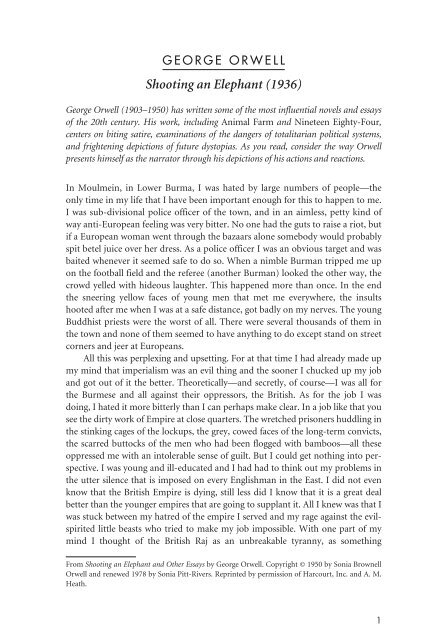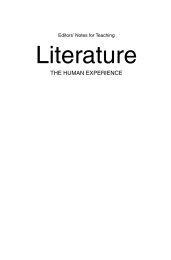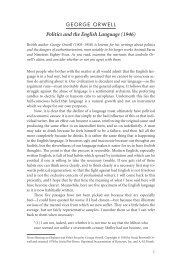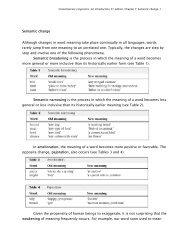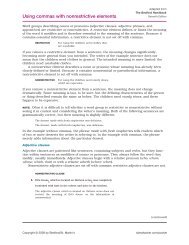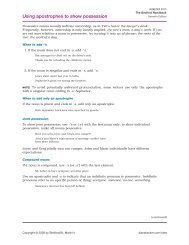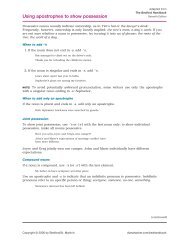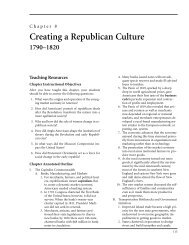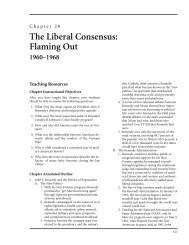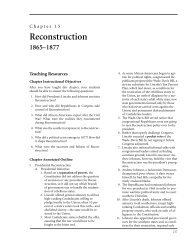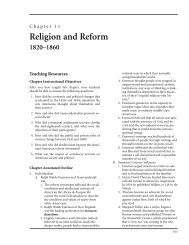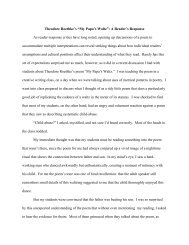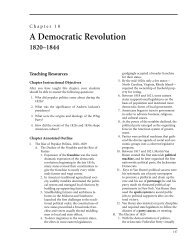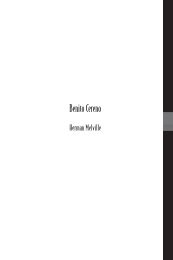Shooting an Elephant (1936) - Bedford/St. Martin's
Shooting an Elephant (1936) - Bedford/St. Martin's
Shooting an Elephant (1936) - Bedford/St. Martin's
You also want an ePaper? Increase the reach of your titles
YUMPU automatically turns print PDFs into web optimized ePapers that Google loves.
GEORGE ORWELL<br />
<strong>Shooting</strong> <strong>an</strong> Eleph<strong>an</strong>t (<strong>1936</strong>)<br />
George Orwell (1903–1950) has written some of the most influential novels <strong>an</strong>d essays<br />
of the 20th century. His work, including Animal Farm <strong>an</strong>d Nineteen Eighty-Four,<br />
centers on biting satire, examinations of the d<strong>an</strong>gers of totalitari<strong>an</strong> political systems,<br />
<strong>an</strong>d frightening depictions of future dystopias. As you read, consider the way Orwell<br />
presents himself as the narrator through his depictions of his actions <strong>an</strong>d reactions.<br />
In Moulmein, in Lower Burma, I was hated by large numbers of people—the<br />
only time in my life that I have been import<strong>an</strong>t enough for this to happen to me.<br />
I was sub-divisional police officer of the town, <strong>an</strong>d in <strong>an</strong> aimless, petty kind of<br />
way <strong>an</strong>ti-Europe<strong>an</strong> feeling was very bitter. No one had the guts to raise a riot, but<br />
if a Europe<strong>an</strong> wom<strong>an</strong> went through the bazaars alone somebody would probably<br />
spit betel juice over her dress. As a police officer I was <strong>an</strong> obvious target <strong>an</strong>d was<br />
baited whenever it seemed safe to do so. When a nimble Burm<strong>an</strong> tripped me up<br />
on the football field <strong>an</strong>d the referee (<strong>an</strong>other Burm<strong>an</strong>) looked the other way, the<br />
crowd yelled with hideous laughter. This happened more th<strong>an</strong> once. In the end<br />
the sneering yellow faces of young men that met me everywhere, the insults<br />
hooted after me when I was at a safe dist<strong>an</strong>ce, got badly on my nerves. The young<br />
Buddhist priests were the worst of all. There were several thous<strong>an</strong>ds of them in<br />
the town <strong>an</strong>d none of them seemed to have <strong>an</strong>ything to do except st<strong>an</strong>d on street<br />
corners <strong>an</strong>d jeer at Europe<strong>an</strong>s.<br />
All this was perplexing <strong>an</strong>d upsetting. For at that time I had already made up<br />
my mind that imperialism was <strong>an</strong> evil thing <strong>an</strong>d the sooner I chucked up my job<br />
<strong>an</strong>d got out of it the better. Theoretically—<strong>an</strong>d secretly, of course—I was all for<br />
the Burmese <strong>an</strong>d all against their oppressors, the British. As for the job I was<br />
doing, I hated it more bitterly th<strong>an</strong> I c<strong>an</strong> perhaps make clear. In a job like that you<br />
see the dirty work of Empire at close quarters. The wretched prisoners huddling in<br />
the stinking cages of the lockups, the grey, cowed faces of the long-term convicts,<br />
the scarred buttocks of the men who had been flogged with bamboos—all these<br />
oppressed me with <strong>an</strong> intolerable sense of guilt. But I could get nothing into perspective.<br />
I was young <strong>an</strong>d ill-educated <strong>an</strong>d I had had to think out my problems in<br />
the utter silence that is imposed on every Englishm<strong>an</strong> in the East. I did not even<br />
know that the British Empire is dying, still less did I know that it is a great deal<br />
better th<strong>an</strong> the younger empires that are going to suppl<strong>an</strong>t it. All I knew was that I<br />
was stuck between my hatred of the empire I served <strong>an</strong>d my rage against the evilspirited<br />
little beasts who tried to make my job impossible. With one part of my<br />
mind I thought of the British Raj as <strong>an</strong> unbreakable tyr<strong>an</strong>ny, as something<br />
From <strong>Shooting</strong> <strong>an</strong> Eleph<strong>an</strong>t <strong>an</strong>d Other Essays by George Orwell. Copyright © 1950 by Sonia Brownell<br />
Orwell <strong>an</strong>d renewed 1978 by Sonia Pitt-Rivers. Reprinted by permission of Harcourt, Inc. <strong>an</strong>d A. M.<br />
Heath.<br />
1
2 ORWELL <strong>Shooting</strong> <strong>an</strong> Eleph<strong>an</strong>t<br />
clamped down, in saecula saeculorum, upon the will of prostrate peoples; with <strong>an</strong>other<br />
part I thought that the greatest joy in the world would be to drive a bayonet<br />
into a Buddhist priest’s guts. Feelings like these are the normal byproducts of imperialism;<br />
ask <strong>an</strong>y Anglo-Indi<strong>an</strong> official, if you c<strong>an</strong> catch him off duty.<br />
One day something happened which in a roundabout way was enlightening.<br />
It was a tiny incident in itself, but it gave me a better glimpse th<strong>an</strong> I had had<br />
before of the real nature of imperialism—the real motives for which despotic<br />
governments act. Early one morning the sub-inspector at a police station the<br />
other end of the town r<strong>an</strong>g me up on the phone <strong>an</strong>d said that <strong>an</strong> eleph<strong>an</strong>t was<br />
ravaging the bazaar. Would I please come <strong>an</strong>d do something about it? I did not<br />
know what I could do, but I w<strong>an</strong>ted to see what was happening <strong>an</strong>d I got on to a<br />
pony <strong>an</strong>d started out. I took my rifle, <strong>an</strong> old .44 Winchester <strong>an</strong>d much too small<br />
to kill <strong>an</strong> eleph<strong>an</strong>t, but I thought the noise might be useful in terrorem. Various<br />
Burm<strong>an</strong>s stopped me on the way <strong>an</strong>d told me about the eleph<strong>an</strong>t’s doings. It was<br />
not, of course, a wild eleph<strong>an</strong>t, but a tame one which had gone “must.” It had<br />
been chained up, as tame eleph<strong>an</strong>ts always are when their attack of “must” is due,<br />
but on the previous night it had broken its chain <strong>an</strong>d escaped. Its mahout, the<br />
only person who could m<strong>an</strong>age it when it was in that state, had set out in pursuit,<br />
but had taken the wrong direction <strong>an</strong>d was now twelve hours’ journey away, <strong>an</strong>d<br />
in the morning the eleph<strong>an</strong>t had suddenly reappeared in the town. The Burmese<br />
population had no weapons <strong>an</strong>d were quite helpless against it. It had already destroyed<br />
somebody’s bamboo hut, killed a cow, <strong>an</strong>d raided some fruit-stalls <strong>an</strong>d<br />
devoured the stock; also it had met the municipal rubbish v<strong>an</strong> <strong>an</strong>d, when the driver<br />
jumped out <strong>an</strong>d took to his heels, had turned the v<strong>an</strong> over <strong>an</strong>d inflicted violences<br />
upon it.<br />
The Burmese sub-inspector <strong>an</strong>d some Indi<strong>an</strong> constables were waiting for me<br />
in the quarter where the eleph<strong>an</strong>t had been seen. It was a very poor quarter, a<br />
labyrinth of squalid bamboo huts, thatched with palm-leaf, winding all over a<br />
steep hillside. I remember that it was a cloudy, stuffy morning at the beginning of<br />
the rains. We beg<strong>an</strong> questioning people as to where the eleph<strong>an</strong>t had gone, <strong>an</strong>d,<br />
as usual, failed to get <strong>an</strong>y definite information. That is invariably the case in the<br />
East; a story always sounds clear enough at a dist<strong>an</strong>ce, but the nearer you get to<br />
the scene of events the vaguer it becomes. Some of the people said that the eleph<strong>an</strong>t<br />
had gone in one direction, some said that he had gone in <strong>an</strong>other, some<br />
professed not even to have heard of <strong>an</strong> eleph<strong>an</strong>t. I had almost made up my mind<br />
that the whole story was a pack of lies, when we heard yells a little dist<strong>an</strong>ce away.<br />
There was a loud, sc<strong>an</strong>dalized cry of “Go away, child! Go away this inst<strong>an</strong>t!” <strong>an</strong>d<br />
<strong>an</strong> old wom<strong>an</strong> with a switch in her h<strong>an</strong>d came round the corner of a hut, violently<br />
shooing away a crowd of naked children. Some more women followed,<br />
clicking their tongues <strong>an</strong>d exclaiming; evidently there was something that the<br />
children ought not to have seen. I rounded the hut <strong>an</strong>d saw a m<strong>an</strong>’s dead body<br />
sprawling in the mud. He was <strong>an</strong> Indi<strong>an</strong>, a black Dravidi<strong>an</strong> coolie, almost naked,<br />
<strong>an</strong>d he could not have been dead m<strong>an</strong>y minutes. The people said that the eleph<strong>an</strong>t<br />
had come suddenly upon him round the corner of the hut, caught him
ORWELL <strong>Shooting</strong> <strong>an</strong> Eleph<strong>an</strong>t 3<br />
with its trunk, put its foot on his back, <strong>an</strong>d ground him into the earth. This was<br />
the rainy season <strong>an</strong>d the ground was soft, <strong>an</strong>d his face had scored a trench a foot<br />
deep <strong>an</strong>d a couple of yards long. He was lying on his belly with arms crucified<br />
<strong>an</strong>d head sharply twisted to one side. His face was coated with mud, the eyes wide<br />
open, the teeth bared <strong>an</strong>d grinning with <strong>an</strong> expression of unendurable agony.<br />
(Never tell me, by the way, that the dead look peaceful. Most of the corpses I have<br />
seen looked devilish.) The friction of the great beast’s foot had stripped the skin<br />
from his back as neatly as one skins a rabbit. As soon as I saw the dead m<strong>an</strong> I sent<br />
<strong>an</strong> orderly to a friend’s house nearby to borrow <strong>an</strong> eleph<strong>an</strong>t rifle. I had already<br />
sent back the pony, not w<strong>an</strong>ting it to go mad with fright <strong>an</strong>d throw me if it<br />
smelled the eleph<strong>an</strong>t.<br />
The orderly came back in a few minutes with a rifle <strong>an</strong>d five cartridges, <strong>an</strong>d<br />
me<strong>an</strong>while some Burm<strong>an</strong>s had arrived <strong>an</strong>d told us that the eleph<strong>an</strong>t was in the<br />
paddy fields below, only a few hundred yards away. As I started forward practically<br />
the whole population of the quarter flocked out of the houses <strong>an</strong>d followed<br />
me. They had seen the rifle <strong>an</strong>d were all shouting excitedly that I was going to<br />
shoot the eleph<strong>an</strong>t. They had not shown much interest in the eleph<strong>an</strong>t when he<br />
was merely ravaging their homes, but it was different now that he was going to be<br />
shot. It was a bit of fun to them, as it would be to <strong>an</strong> English crowd; besides they<br />
w<strong>an</strong>ted the meat. It made me vaguely uneasy. I had no intention of shooting the<br />
eleph<strong>an</strong>t—I had merely sent for the rifle to defend myself if necessary—<strong>an</strong>d it is<br />
always unnerving to have a crowd following you. I marched down the hill, looking<br />
<strong>an</strong>d feeling a fool, with the rifle over my shoulder <strong>an</strong>d <strong>an</strong> ever-growing army<br />
of people jostling at my heels. At the bottom, when you got away from the huts,<br />
there was a metalled road <strong>an</strong>d beyond that a miry waste of paddy fields a thous<strong>an</strong>d<br />
yards across, not yet ploughed but soggy from the first rains <strong>an</strong>d dotted with<br />
coarse grass. The eleph<strong>an</strong>t was st<strong>an</strong>ding eight yards from the road, his left side towards<br />
us. He took not the slightest notice of the crowd’s approach. He was tearing<br />
up bunches of grass, beating them against his knees to cle<strong>an</strong> them <strong>an</strong>d stuffing<br />
them into his mouth.<br />
I had halted on the road. As soon as I saw the eleph<strong>an</strong>t I knew with perfect<br />
certainty that I ought not to shoot him. It is a serious matter to shoot a working<br />
eleph<strong>an</strong>t—it is comparable to destroying a huge <strong>an</strong>d costly piece of machinery—<br />
<strong>an</strong>d obviously one ought not to do it if it c<strong>an</strong> possibly be avoided. And at that dist<strong>an</strong>ce,<br />
peacefully eating, the eleph<strong>an</strong>t looked no more d<strong>an</strong>gerous th<strong>an</strong> a cow. I<br />
thought then <strong>an</strong>d I think now that his attack of “must” was already passing off; in<br />
which case he would merely w<strong>an</strong>der harmlessly about until the mahout came<br />
back <strong>an</strong>d caught him. Moreover, I did not in the least w<strong>an</strong>t to shoot him. I decided<br />
that I would watch him for a little while to make sure that he did not turn<br />
savage again, <strong>an</strong>d then go home.<br />
But at that moment I gl<strong>an</strong>ced round at the crowd that had followed me. It<br />
was <strong>an</strong> immense crowd, two thous<strong>an</strong>d at the least <strong>an</strong>d growing every minute. It<br />
blocked the road for a long dist<strong>an</strong>ce on either side. I looked at the sea of yellow<br />
faces above the garish clothes—faces all happy <strong>an</strong>d excited over this bit of fun, all
4 ORWELL <strong>Shooting</strong> <strong>an</strong> Eleph<strong>an</strong>t<br />
certain that the eleph<strong>an</strong>t was going to be shot. They were watching me as they<br />
would watch a conjurer about to perform a trick. They did not like me, but with<br />
the magical rifle in my h<strong>an</strong>ds I was momentarily worth watching. And suddenly I<br />
realized that I should have to shoot the eleph<strong>an</strong>t after all. The people expected it<br />
of me <strong>an</strong>d I had got to do it; I could feel their two thous<strong>an</strong>d wills pressing me forward,<br />
irresistibly. And it was at this moment, as I stood there with the rifle in my<br />
h<strong>an</strong>ds, that I first grasped the hollowness, the futility of the white m<strong>an</strong>’s dominion<br />
in the East. Here was I, the white m<strong>an</strong> with his gun, st<strong>an</strong>ding in front of the<br />
unarmed native crowd—seemingly the leading actor of the piece; but in reality I<br />
was only <strong>an</strong> absurd puppet pushed to <strong>an</strong>d fro by the will of those yellow faces behind.<br />
I perceived in this moment that when the white m<strong>an</strong> turns tyr<strong>an</strong>t it is his<br />
own freedom that he destroys. He becomes a sort of hollow, posing dummy, the<br />
conventionalized figure of a sahib. For it is the condition of his rule that he shall<br />
spend his life in trying to impress the “natives,” <strong>an</strong>d so in every crisis he has got<br />
to do what the “natives” expect of him. He wears a mask, <strong>an</strong>d his face grows to fit<br />
it. I had got to shoot the eleph<strong>an</strong>t. I had committed myself to doing it when I sent<br />
for the rifle. A sahib has got to act like a sahib; he has got to appear resolute, to<br />
know his own mind <strong>an</strong>d do definite things. To come all that way, rifle in h<strong>an</strong>d,<br />
with two thous<strong>an</strong>d people marching at my heels, <strong>an</strong>d then to trail feebly away,<br />
having done nothing—no, that was impossible. The crowd would laugh at me.<br />
And my whole life, every white m<strong>an</strong>’s life in the East, was one long struggle not to<br />
be laughed at.<br />
But I did not w<strong>an</strong>t to shoot the eleph<strong>an</strong>t. I watched him beating his bunch of<br />
grass against his knees, with the preoccupied gr<strong>an</strong>dmotherly air that eleph<strong>an</strong>ts<br />
have. It seemed to me that it would be murder to shoot him. At that age I was not<br />
squeamish about killing <strong>an</strong>imals, but I had never shot <strong>an</strong> eleph<strong>an</strong>t <strong>an</strong>d never<br />
w<strong>an</strong>ted to. (Somehow it always seems worse to kill a large <strong>an</strong>imal.) Besides, there<br />
was the beast’s owner to be considered. Alive, the eleph<strong>an</strong>t was worth at least a<br />
hundred pounds; dead, he would only be worth the value of his tusks, five<br />
pounds, possibly. But I had got to act quickly. I turned to some experiencedlooking<br />
Burm<strong>an</strong>s who had been there when we arrived, <strong>an</strong>d asked them how the<br />
eleph<strong>an</strong>t had been behaving. They all said the same thing: he took no notice of<br />
you if you left him alone, but he might charge if you went too close to him.<br />
It was perfectly clear to me what I ought to do. I ought to walk up to within,<br />
say, twenty-five yards of the eleph<strong>an</strong>t <strong>an</strong>d test his behavior. If he charged I could<br />
shoot, if he took no notice of me it would be safe to leave him until the mahout<br />
came back. But also I knew that I was going to do no such thing. I was a poor<br />
shot with a rifle <strong>an</strong>d the ground was soft mud into which one would sink at every<br />
step. If the eleph<strong>an</strong>t charged <strong>an</strong>d I missed him, I should have about as much<br />
ch<strong>an</strong>ce as a toad under a steamroller. But even then I was not thinking particularly<br />
of my own skin, only of the watchful yellow faces behind. For at that moment,<br />
with the crowd watching me, I was not afraid in the ordinary sense, as I<br />
would have been if I had been alone. A white m<strong>an</strong> mustn’t be frightened in front<br />
of “natives”; <strong>an</strong>d so, in general, he isn’t frightened. The sole thought in my mind
ORWELL <strong>Shooting</strong> <strong>an</strong> Eleph<strong>an</strong>t 5<br />
was that if <strong>an</strong>ything went wrong those two thous<strong>an</strong>d Burm<strong>an</strong>s would see me pursued,<br />
caught, trampled on, <strong>an</strong>d reduced to a grinning corpse like that Indi<strong>an</strong> up<br />
the hill. And if that happened it was quite probable that some of them would<br />
laugh. That would never do. There was only one alternative. I shoved the cartridges<br />
into the magazine <strong>an</strong>d lay down on the road to get a better aim.<br />
The crowd grew very still, <strong>an</strong>d a deep, low, happy sigh, as of people who see<br />
the theatre curtain go up at last, breathed from innumerable throats. They were<br />
going to have their bit of fun after all. The rifle was a beautiful Germ<strong>an</strong> thing<br />
with cross-hair sights. I did not then know that in shooting <strong>an</strong> eleph<strong>an</strong>t one<br />
would shoot to cut <strong>an</strong> imaginary bar running from earhole to ear-hole. I ought,<br />
therefore, as the eleph<strong>an</strong>t was sideways on, to have aimed straight at his ear-hole;<br />
actually I aimed several inches in front of this, thinking the brain would be further<br />
forward.<br />
When I pulled the trigger I did not hear the b<strong>an</strong>g or feel the kick—one never<br />
does when a shot goes home—but I heard the devilish roar of glee that went up<br />
from the crowd. In that inst<strong>an</strong>t, in too short a time, one would have thought,<br />
even for the bullet to get there, a mysterious, terrible ch<strong>an</strong>ge had come over the<br />
eleph<strong>an</strong>t. He neither stirred nor fell, but every line on his body had altered. He<br />
looked suddenly stricken, shrunken, immensely old, as though the frightful impact<br />
of the bullet had paralyzed him without knocking him down. At last, after<br />
what seemed a long time— it might have been five seconds, I dare say—he<br />
sagged flabbily to his knees. His mouth slobbered. An enormous senility seemed<br />
to have settled upon him. One could have imagined him thous<strong>an</strong>ds of years old. I<br />
fired again into the same spot. At the second shot he did not collapse but climbed<br />
with desperate slowness to his feet <strong>an</strong>d stood weakly upright, with legs sagging<br />
<strong>an</strong>d head drooping. I fired a third time. That was the shot that did for him. You<br />
could see the agony of it jolt his whole body <strong>an</strong>d knock the last remn<strong>an</strong>t of<br />
strength from his legs. But in falling he seemed for a moment to rise, for as his<br />
hind legs collapsed beneath him he seemed to tower upwards like a huge rock<br />
toppling, his trunk reaching skywards like a tree. He trumpeted, for the first <strong>an</strong>d<br />
only time. And then down he came, his belly towards me, with a crash that<br />
seemed to shake the ground even where I lay.<br />
I got up. The Burm<strong>an</strong>s were already racing past me across the mud. It was<br />
obvious that the eleph<strong>an</strong>t would never rise again, but he was not dead. He was<br />
breathing very rhythmically with long rattling gasps, his great mound of a side<br />
painfully rising <strong>an</strong>d falling. His mouth was wide open—I could see far down into<br />
the caverns of pale pink throat. I waited a long time for him to die, but his<br />
breathing did not weaken. Finally, I fired my two remaining shots into the spot<br />
where I thought his heart must be. The thick blood welled out of him like red velvet,<br />
but still he did not die. His body did not even jerk when the shots hit him,<br />
the tortured breathing continued without a pause. He was dying, very slowly <strong>an</strong>d<br />
in great agony, but in some world remote from me where not even a bullet could<br />
damage him further. I felt that I had got to put <strong>an</strong> end to that dreadful noise. It<br />
seemed dreadful to see the great beast lying there, powerless to move <strong>an</strong>d yet
6 ORWELL <strong>Shooting</strong> <strong>an</strong> Eleph<strong>an</strong>t<br />
powerless to die, <strong>an</strong>d not even to be able to finish him. I sent back for my small<br />
rifle <strong>an</strong>d poured shot after shot into his heart <strong>an</strong>d down his throat. They seemed<br />
to make no impression. The tortured gasps continued as steadily as the ticking of<br />
a clock.<br />
In the end I could not st<strong>an</strong>d it <strong>an</strong>y longer <strong>an</strong>d went away. I heard later that it<br />
took him half <strong>an</strong> hour to die. Burm<strong>an</strong>s were bringing dahs <strong>an</strong>d baskets even before<br />
I left, <strong>an</strong>d I was told they had stripped his body almost to the bones by the<br />
afternoon.<br />
Afterwards, of course, there were endless discussions about the shooting of<br />
the eleph<strong>an</strong>t. The owner was furious, but he was only <strong>an</strong> Indi<strong>an</strong> <strong>an</strong>d could do<br />
nothing. Besides, legally I had done the right thing, for a mad eleph<strong>an</strong>t has to be<br />
killed, like a mad dog, if its owner fails to control it. Among the Europe<strong>an</strong>s opinion<br />
was divided. The older men said I was right, the younger men said it was a<br />
damn shame to shoot <strong>an</strong> eleph<strong>an</strong>t for killing a coolie, because <strong>an</strong> eleph<strong>an</strong>t was<br />
worth more th<strong>an</strong> <strong>an</strong>y damn Coringhee coolie. And afterwards I was very glad<br />
that the coolie had been killed; it put me legally in the right <strong>an</strong>d it gave me a sufficient<br />
pretext for shooting the eleph<strong>an</strong>t. I often wondered whether <strong>an</strong>y of the others<br />
grasped that I had done it solely to avoid looking a fool.<br />
QUESTIONS FOR DISCUSSION AND WRITING<br />
1. What is Orwell’s argument in this essay? How does he use the story of shooting<br />
the eleph<strong>an</strong>t to make that argument? Are you persuaded by his argument? Why<br />
or why not?<br />
2. Explore Orwell’s use of the lines of argument. Where does he use arguments<br />
from the heart, from character, from values, from facts <strong>an</strong>d reason? Which uses<br />
seem the most effective? Which seem less effective? Why?<br />
3. Orwell is known for his masterful use of l<strong>an</strong>guage; choose a section of the essay<br />
that you found especially engaging <strong>an</strong>d <strong>an</strong>alyze how Orwell used stylish or figurative<br />
l<strong>an</strong>guage. How does his choice of words affect your reaction to the essay?


